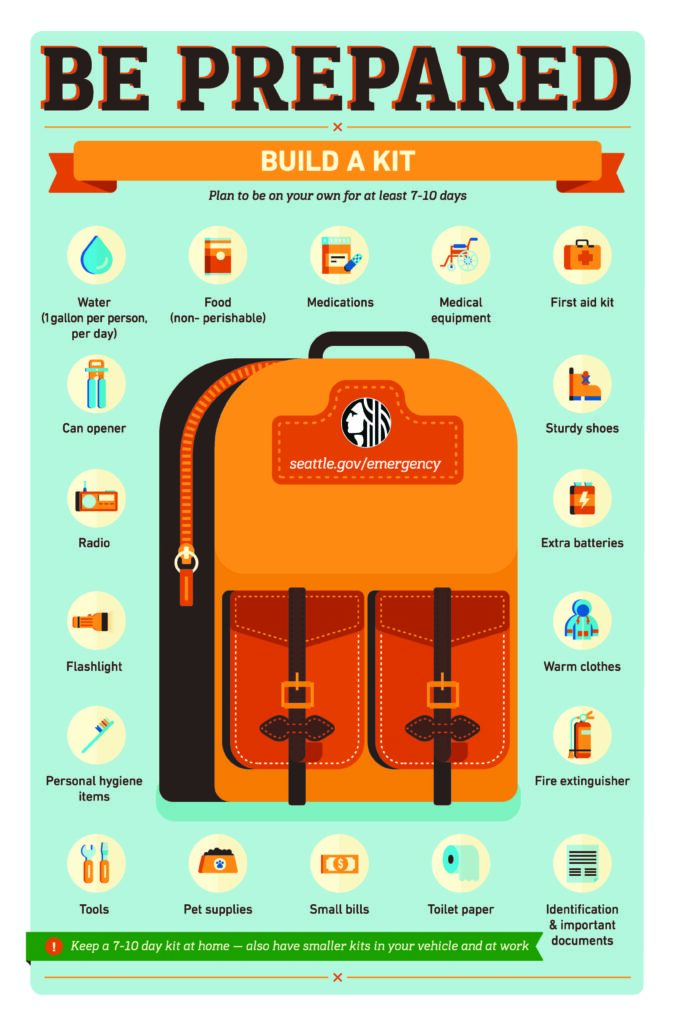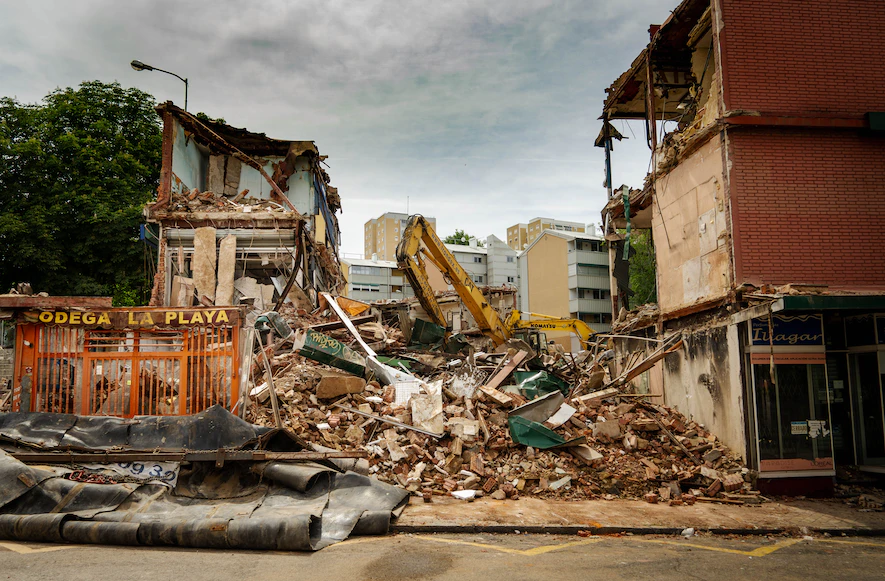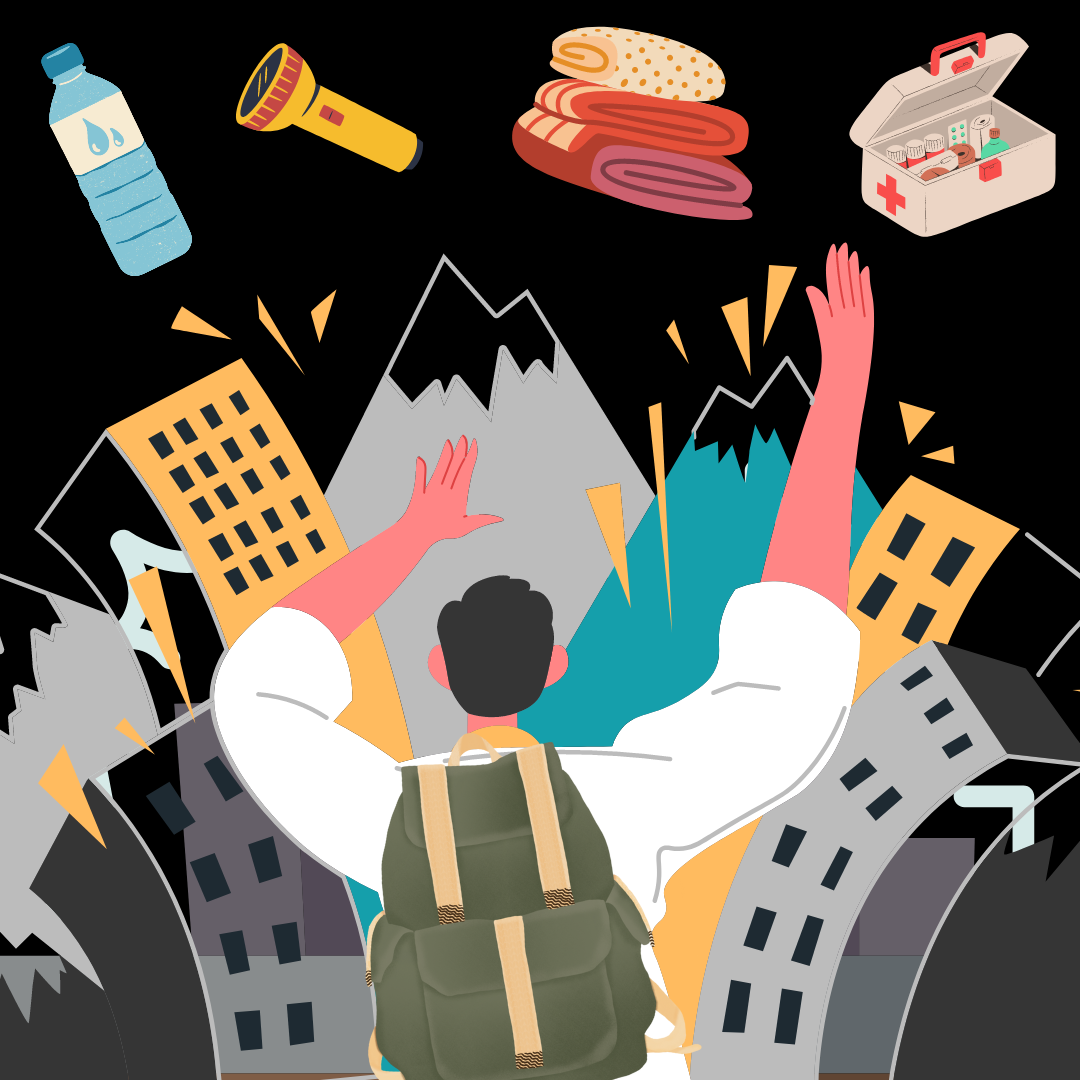Your earthquake emergency pack will ensure you have everything you need close at hand and will treat any wounds until help arrives. Create an emergency kit for disaster preparedness with these earthquake kit suggestions, and fill it with goods to prepare your family for the next major calamity. Putting together an earthquake emergency pack is crucial to being prepared for natural catastrophes.
What should essential items be included in an Earthquake Emergency Kit?
Twelve thousand people from the Bay Area lost their homes due to the Loma Prieta earthquake in 1989. Many of those whose homes were still standing were without phones, water, or electricity for days. The following essential materials should be on hand:

- Three days’ worth of water for every person in your family (at least 1 gallon per person, per day)
- A can opener and three days’ worth of nonperishable food
- Home and car both equipped with first aid supplies
- Water and food for your pets for three days.
- Every room has a torch with additional batteries.
- Mobile phones & power banks
- Medications on prescription
- Swiss Army knife with whistle
- Print out your important personal papers
- Additional glasses
- Dry fruits & nuts, canned food, etc.
- Cash for backup (pack it in a waterproof packet)

Water: The essential component of any emergency pack is the ability to store water. The Centers for Disease Control and Prevention (CDC) advises keeping three water days for each person. Replace the water every six months, and store it somewhere cool and dry that isn’t in the sun.
Non-perishable food: Energy bars, dried fruit, and canned items are all excellent options. Don’t eat anything that needs to be cooked or refrigerated; rotate your stock every six months to keep it fresh.
First-aid kit: In any emergency, having a first-aid kit is crucial. Bandages, gauze, antiseptic wipes, painkillers, and any prescription medications you might require should all be included. Verify the expiration dates and replace any items that have passed their prime.
Flashlights and additional batteries: You can lose power during an earthquake. Ensure that each individual has a torch and extra batteries. Because they are more energy-efficient and have longer battery lives, think about choosing LED spotlights.
Whistle: If you get stuck, using a whistle to alert you for assistance is helpful. Ensure everyone in your household knows how to use one, and keep one in your kit.
Dust masks: After an earthquake, the air may be dusty and debris-filled. A dust mask can protect your lungs against dust and other particles.
Blankets: Earthquakes can destroy homes, so you might need to stay put until aid arrives. Use blankets or sleeping bags to keep warm.
Clothes & Shoes: Bring additional clothing and footwear if you need to evacuate. Consider bringing a pair of solid work gloves to safeguard your hands during the cleanup.
Battery: A hand-cranked or battery-operated portable radio can help you keep up with the situation. A hand-crank charger or extra batteries should be brought.
Items for personal hygiene: It’s critical to practice excellent hygiene when a disaster strikes. Bring supplies like moist towels, hand sanitizer, and toilet paper.
Cash: ATMs and credit card readers might not function in the case of an earthquake. Have some money on hand, just in case.
Essential documents: Store copies of crucial documents, like birth certificates, insurance policies, and passports, in a watertight container. Think about keeping them in a fireproof safe or a safe internet storage facility.
Multi-tool or utility knife: A versatile tool, such as a multi-tool or utility knife, can be helpful in various circumstances. Think about including a utility knife or multi-tool in your kit.
To make sure that your earthquake emergency kit is current and appropriate for your needs, remember to inspect and update it routinely. Having a plan for where to meet your family or loved ones in case you become separated during the earthquake is also a brilliant idea. Be ready and keep yourself safe!

How To Protect Your House Before a Major Earthquake?
Protecting your home before a severe earthquake can help lower the chance of injury or property damage because earthquakes can seriously damage dwellings. Here are some recommendations to help you safeguard your home before a significant earthquake:
Protect heavy appliances and furniture: Significant damage results when heavy appliances and furniture collapse during an earthquake. Use brackets or straps to fasten bookshelves, shelves, and other heavy furniture to the wall. Similarly, use belts or braces to secure items like TVs, refrigerators, and water heaters to the wall or floor.
Install glass that can withstand earthquakes: Regular windows can break during an earthquake, leading to injuries and property damage. Consider using glass that can survive earthquakes by installing earthquake-resistant glass.
Strengthen your chimney: During an earthquake, chimneys can be particularly fragile. A qualified contractor should brace your chimney to keep it from falling.
Strengthen your foundation: A house’s foundation determines how sturdy it is. Installing foundation bolts or braces can assist in preventing your home from shifting during an earthquake by strengthening your foundation.
Remodel your home: If your home was built before 1980, it might have yet to be created to withstand earthquake effects. Your home may benefit from retrofitting to increase its quake resistance. A qualified contractor can inspect your home and make retrofitting recommendations.
Maintain your home: Regular maintenance might help shield your home from earthquake damage. Repair any foundation or wall cracks immediately, and routinely check your roof for damage.
Develop a catastrophe plan for your family: Last but not least, do so. If you become separated during an earthquake, this plan should outline where to meet, how to communicate, and what to do in case of injuries or other crises.The safety of your family and property depends on protecting your home before a significant earthquake. Considering these suggestions, you can lessen the possibility of damage and injuries during an earthquake.
What are the Best Foods to have on hand in case of an Earthquake?

It’s crucial to consider more than simply emergency supplies when getting ready for an earthquake. After an earthquake, having a collection of food on hand is beneficial. Some of the most sumptuous meals to have on hand in case of an earthquake are listed below:
Canned Food: Because they have a long shelf life and don’t need refrigeration, food in cans is a fantastic alternative for quake preparedness. Look for fruits, vegetables, and meats in cans.
Dried fruits: Foods dried out include nuts, seeds, and jerky. They contain a lot of protein and other nutrients, are lightweight and are simple to store.
Energy bars: A practical and wholesome choice for seismic preparedness are energy bars. Seek for bars that are low in sugar, rich in protein, and high in fiber.
Water: Having a lot of water on hand is vital because it is necessary for survival. Make sure you have adequate water for at least three days, and aim for at least one gallon per person every day.
Peanut butter: Peanut butter doesn’t need to be refrigerated and is a fantastic source of protein and good fats. Also, it adds flavor and versatility to a variety of cuisines.
Crackers: Because they are shelf-stable and convenient to store, crackers are an excellent alternative for preparing for earthquakes. For added nutrients, look for whole-grain crackers.
Cereal: Cereal is a different alternative that is shelf-stable, convenient to keep, and offers vital nutrients like fiber and B vitamins.
Focus on non-perishable foods that don’t need refrigeration while stockpiling food for earthquake preparedness. Aim for a combination of protein, carbohydrates, and healthy fats to stay energized and satiated. Moreover, keep enough water on hand because it’s crucial for surviving in the days following an earthquake.
How to Prepare for an Earthquake Emergency?

Make an emergency plan for your family that specifies how to contact one another and where to meet if you get separated. Ensure that everyone in your household knows what to do during an earthquake. Practice dropping to the ground in an earthquake, finding refuge under a sturdy table or desk, and holding on until the shaking stops. Practice this method together to ensure that everyone in your family knows the proper procedure. Assess your home for any threats, such as loose heavy furniture or appliances, and take the necessary precautions to secure them.
Moreover, check that your house complies with building codes and get a consultant to look for structural flaws. Assemble an earthquake emergency kit containing supplies like water, non-perishable food, a first aid kit, flashlights and additional batteries, a whistle, dust masks, blankets, extra clothing, a portable radio, personal hygiene products, money, and important papers. Consider fastening large, heavy items like bookshelves and TVs to prevent collapsing during an earthquake, injuring people, or inflicting property damage. Stay updated with the Web Capitals for more!


























Leave a Reply